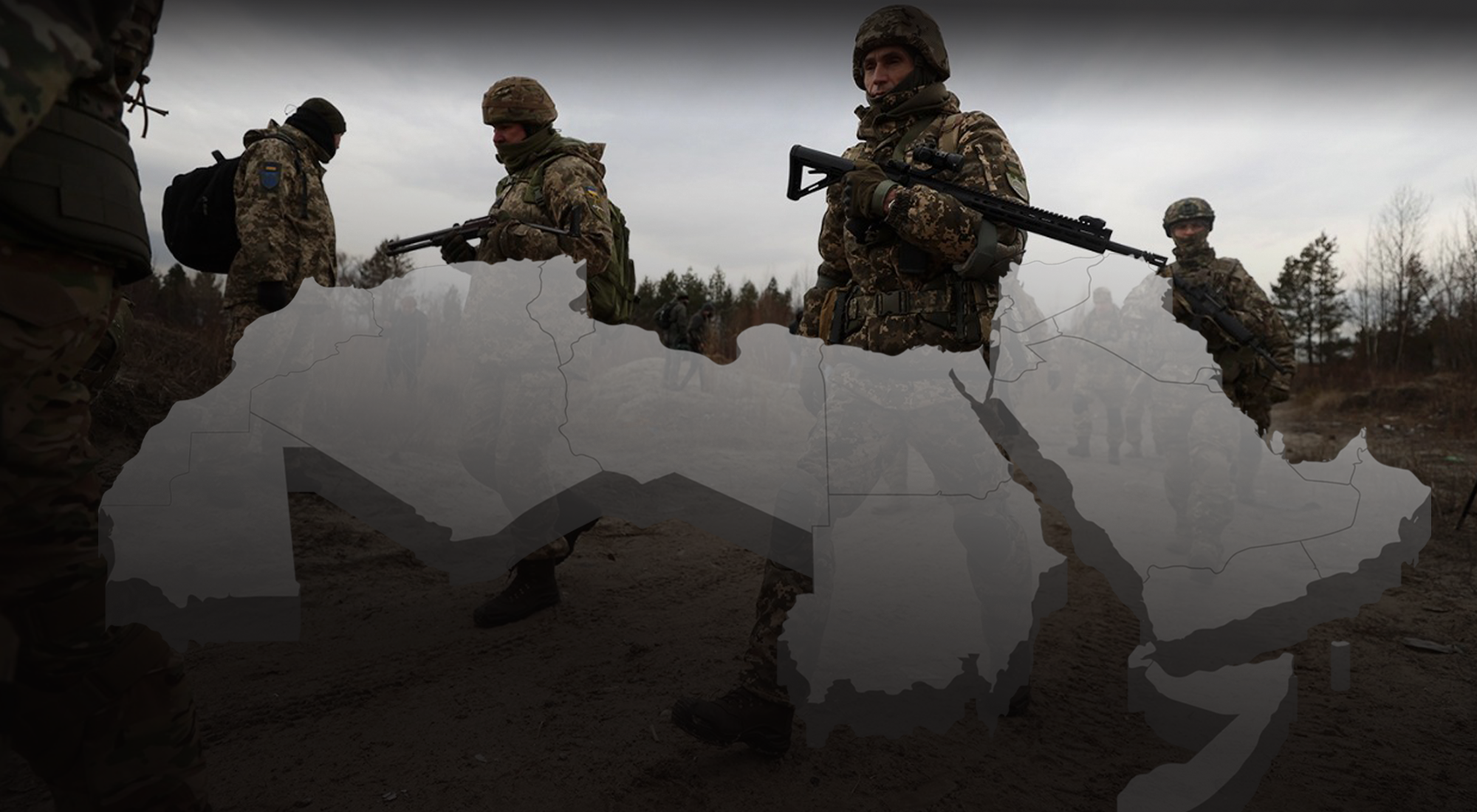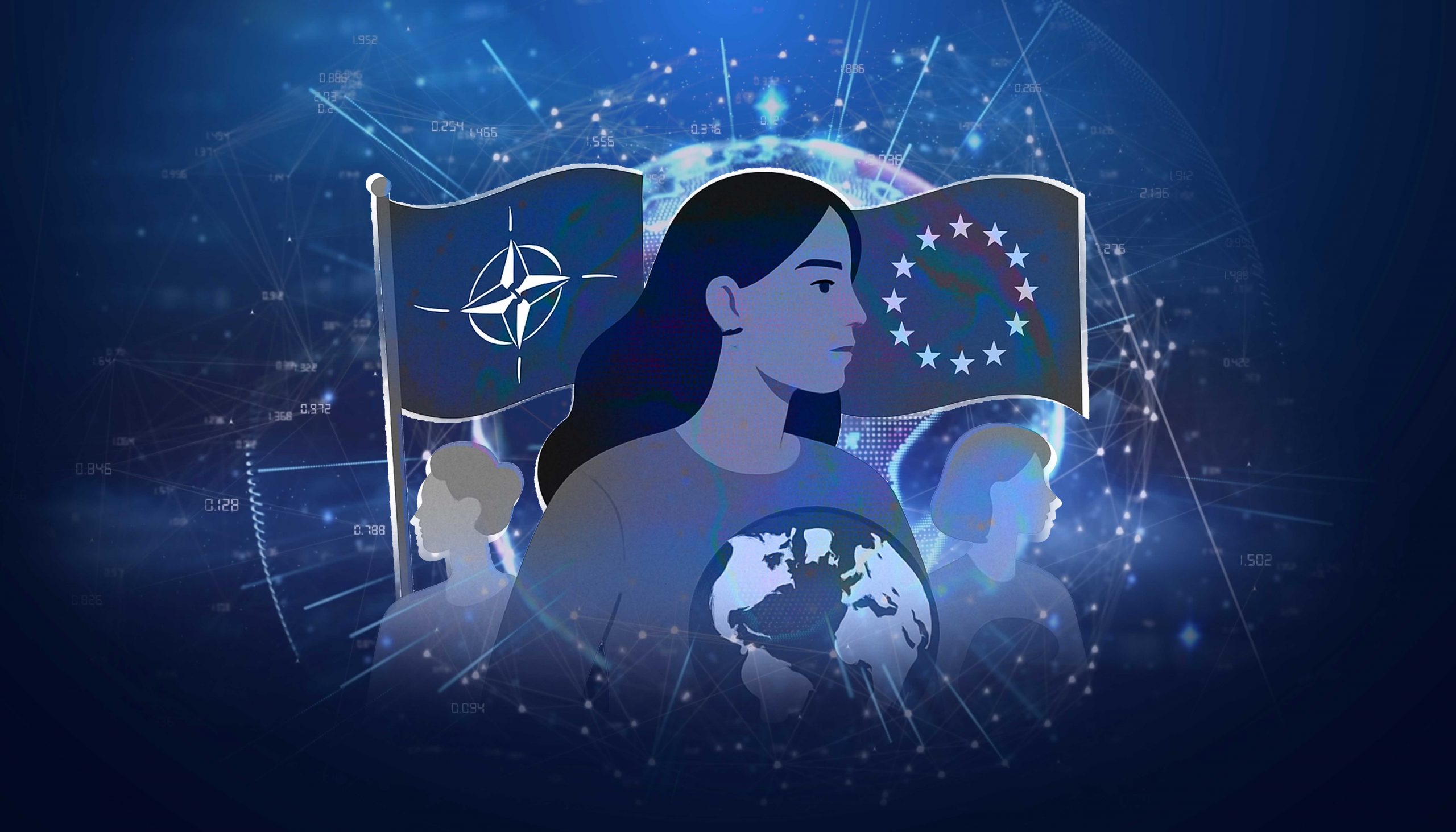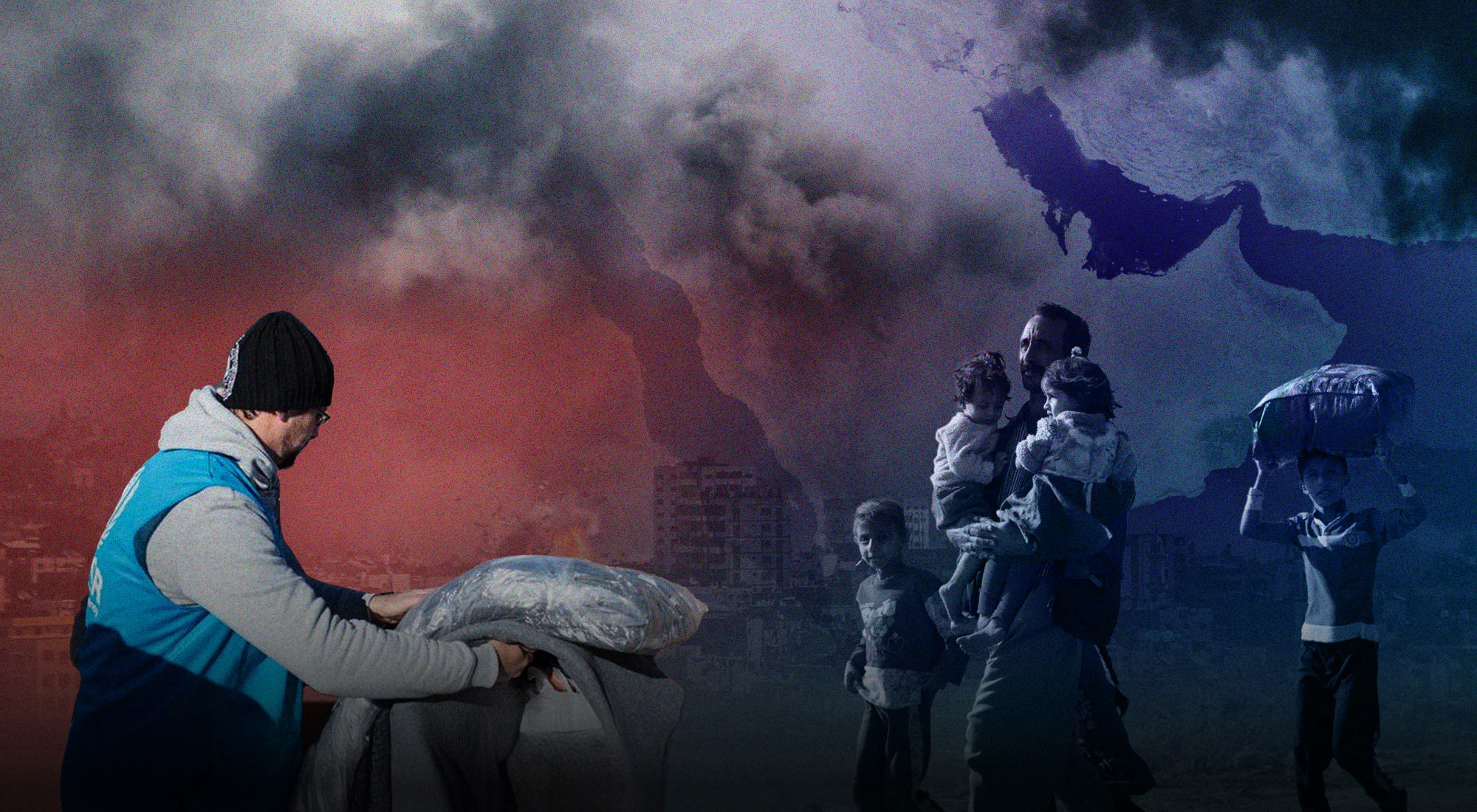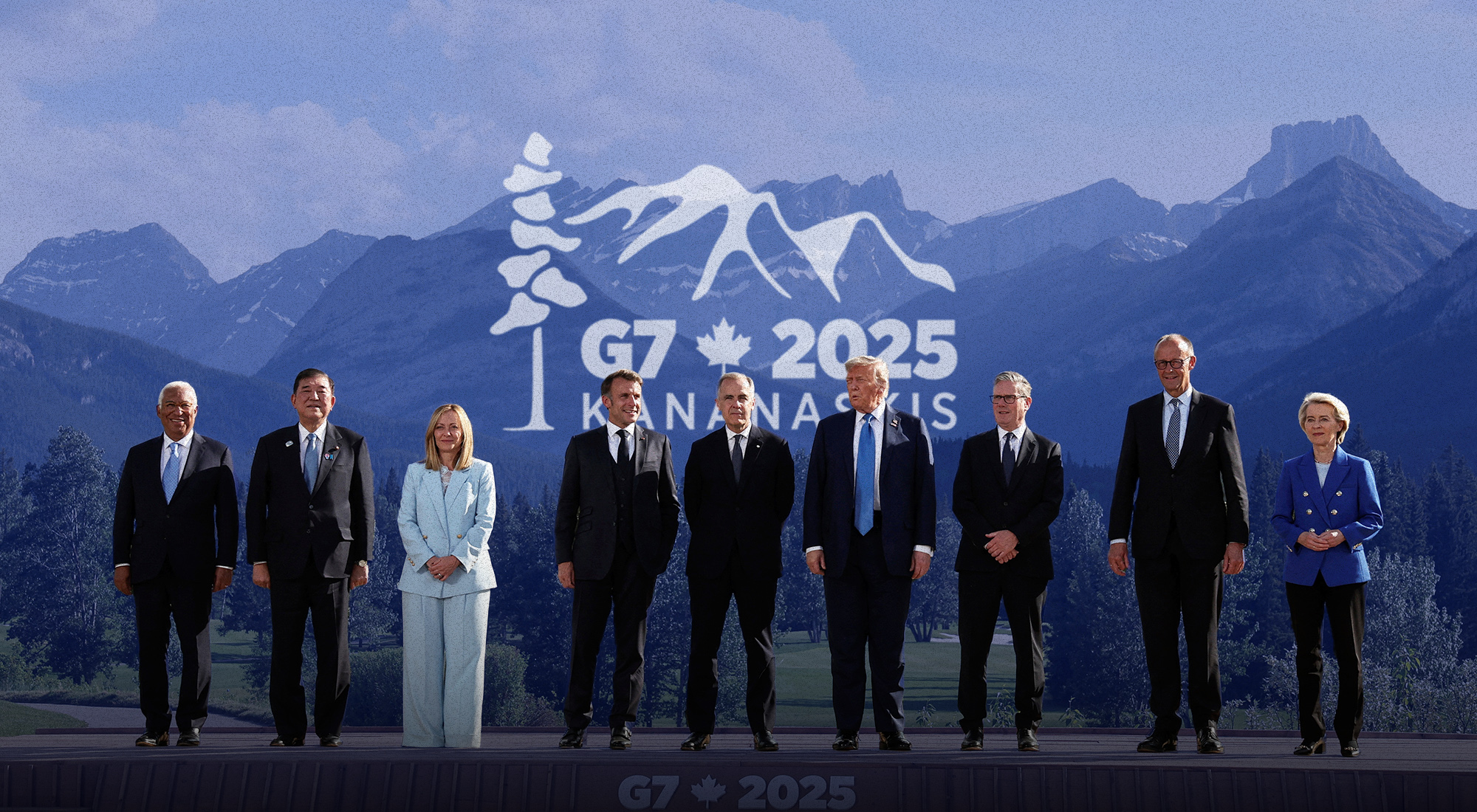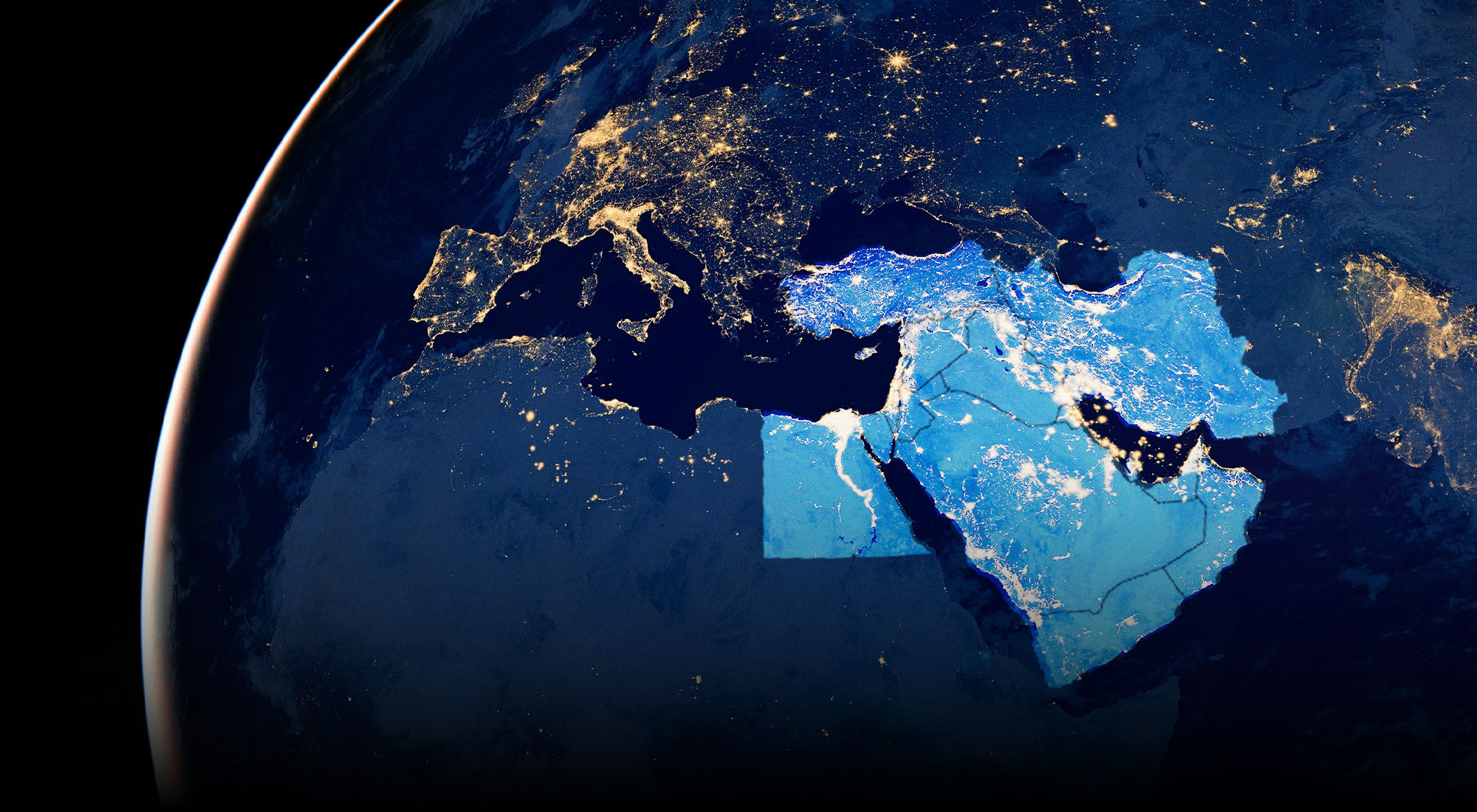Events have accelerated at a breathtaking pace on the eastern side of the European continent since Russia announced, on February 24, 2022, the start of its military operations in Ukraine, which included air and missile strikes and a ground invasion.[1] The impact of this European political-military crisis has extended beyond the boundaries of Europe and cast its shadow on the Arab world and the countries of the Middle East. This has brought about serious political, social and economic implications, to the extent that many Arab authorities have been prompted to comment on the crisis[2] and take official stances before the United Nations Security Council[3] (UNSC) and the United Nations General Assembly (UNGA).[4]
This strategic insight examines the Arab authorities’ stances on the Russian-Ukrainian war and how they may impact the war, the Arab regional, and local situations. This examination is undertaken through various steps. First, a number of statements issued and actions taken by Arab authorities are examined in an effort to understand their stances on the Russian-Ukrainian war and its impacts. Those stances are then analyzed in terms of their compatibility with each other. Following this is an in-depth look at the internal conditions of the Arab countries in question and their relationship with Russia, on one side, and Ukraine, the European Union (EU), and the United States (US), on the other.
Official voting
Along with India and China, the United Arab Emirates (UAE) abstained, on February 25, 2022, from voting on a draft resolution deploring and condemning the Russian war on Ukraine. The draft resolution was submitted bilaterally by the US (a permanent member of UNSC) and Albania (a non-permanent member). Out of 15 member states, 11 voted in favor of the resolution, while Russia aborted it by using its veto power as one of the permanent members of the UNSC.[5]
Later, on March 3, 2022, the UAE along with many other Arab member states voted in favor of an UNGA resolution that described the Russian military operations against Ukraine as aggression. As a call to action, the resolution demanded that Russian authorities immediately stop the unlawful use of, or threats to use, military force against any member state of the UN. The results of the vote were as follows:
- 141 members voted in favor of the resolution, which included 16 Arab members: Egypt, the UAE, Saudi Arabia, Bahrain, Qatar, Kuwait, Oman, Yemen, Libya, Mauritania, Tunisia, Comoros, Somalia, Djibouti, Lebanon, and Jordan.
- 35 members abstained from voting, including 3 Arab members, namely Iraq, Algeria, and Sudan.
- 12 including one Arab member, Morocco, were absent from the vote.
- Only 5 members voted against the resolution, including one Arab member, Syria.[6]
It is noteworthy that the West was keen for Egypt to vote before the UNGA against the Russian military operation in Ukraine. The ambassadors of the G7 group countries in Cairo had issued a statement urging the Egyptian authorities to condemn the Russian war on Ukraine.[7]
Asserting commitment to navigation and oil agreements
Amid confirmed and unconfirmed reports of pressures from Western governments on Arab authorities to divert from neutrality with regard to the operation of certain facilities, the Suez Canal Authority (SCA) in Egypt denied, on March 2, 2022, rumors about closing the Suez Canal to Russian ships. In the same context, official statements of the SCA denied rumors of the US demanding that they ban Russian ships from using the Suez Canal. Obviously, the stance of the SCA does not reflect the political orientation of the Egyptian authorities toward the crisis, but rather expresses the Egyptian authorities’ commitment to the Constantinople Convention of 1888.[8] The convention guarantees the neutrality of the Suez Canal in times of peace and of war in accordance with Articles I, IV and V.[9]
Unlike the rumors surrounding the operation of the Suez Canal, British authorities have officially called on Saudi Arabian and Emirati authorities to raise production of crude oil,[10] which would essentially be in breach of the OPEC+ agreement. The OPEC+ agreement – concluded by OPEC countries, including Saudi Arabia and the UAE, along with other major oil exporters, as well as Russia – states the commitment to reduce crude oil output from May 2020 until April 2022.[11] Through this agreement, the global oil market has gradually stabilized following the collapse of crude oil prices amid the outbreak of the COVID-19 pandemic. Crude oil production has been modestly increased since then after an amendment to the agreement in July 2021.[12] However, with the outbreak of the Russian-Ukrainian war, crude oil spot prices have spiked to unprecedented levels,[13] prompting Western governments to call for an increase in crude oil production. Theoretically, an increase in supply may reduce the current high prices that have placed a burden on the budgets of European countries as importers of oil and gas. However, the authorities of the UAE[14] and Saudi Arabia[15] continue to assert their commitment to the OPEC+ agreement, with promises to secure an increase in output within the framework of the upcoming OPEC+ summit.
Official statements
One of the main ways to assess or interpret the stances of the Arab countries on the Russian-Ukrainian war is through the official statements issued by the authorities of those countries in the early days of the war and hours after their voting at the UNSC and the UNGA. Between February 24-25, 2022, 8 Arab countries – Egypt, Qatar, Tunisia, Jordan, Lebanon, Libya, Kuwait, and Syria – issued official statements through which they expressed the stances of their authorities regarding the Russian-Ukrainian crisis and the Russian military intervention in Ukraine. The Egyptian, Tunisian, Jordanian and Qatari[16] statements showed common principles, even if the expressions differed in terms of phrasing and wording. These principles were based on: (1) concerns about the escalation and its regional and global repercussions; (2) a call for self-restraint and the resolution of disputes through dialogue, diplomatic methods, and peaceful means; (3) avoidance of any action that might increase escalation; and (4) concerns about humanitarian repercussions, such as the risks to which civilians are exposed, as stated in the Qatari statement, and the economic repercussions in particular, especially in light of the failure of global markets to recover from the adverse effects of the COVID-19 pandemic. In addition to these principles, the Qatari statement stressed the necessity to refrain from using force, or the threat of force, and to respect the sovereignty, independence, and territorial integrity of states.[17]
The official statements of Kuwait,[18] Lebanon[19] and Libya[20] were consistent with the aforementioned statements regarding the second and third principles, which are related to de-escalation and the return to negotiations and peaceful solutions. In addition, while the Lebanese and Libyan statements clearly condemned the Russian military operation, the Kuwaiti statement expressed explicit sympathy for Ukraine by asserting respect for Ukraine’s sovereignty and independence.[21]
Lacking any sign of compatibility with the above Arab statements, the Syrian statement expressed the full support of the Bashar al-Assad regime for the Russian war on Ukraine, deeming it as a fair and natural measure in face of the policies of the West and their attempt to impose their policies and control on other countries.[22]
Consequently, with the exception of Syria, it can be said that the UAE’s abstention from voting on the UNSC draft resolution condemning Russia was, to a great extent, consistent with the principles underlying the stances of Arab authorities with regard to avoiding escalation and returning to negotiations. The consequences of passing a UNSC resolution, abstractly and in principle (regardless of Russia’s ability to abort the resolution using its veto power), include some measures that can be classified as escalations, such as imposing sanctions, authorizing counter-military operations, and deploying peacekeeping forces to the areas of conflict. The above interpretation of the UAE’s stance before the UNSC was reinforced and supported by a statement from the UAE’s mission to the UN, which affirmed the eagerness of Emirati authorities to reduce escalation, stop violence, resume dialogue, continue sending humanitarian aid, respect international humanitarian law, and protect civilians.[23]
In line with the UAE’s approach to clarifying its stance after the vote, the Egyptian Ministry of Foreign Affairs issued a statement on March 2, 2022, following Egypt’s vote in favor of a resolution condemning the Russian military escalation against Ukraine. In a bolder tone with regards to naming excalatory measures, the statement affirmed Egyptian authorities’ concerns about imposing economic sanctions outside the framework of the international system (probably referring to the UN),[24] perhaps in reference to the economic sanctions that have been imposed on Russia by the EU and the US since 2014. The statement said that the imposition of further economic sanctions only served to worsen the already deteriorating conditions of civilians in many countries.
Mediation initiatives
In a more positive move, on March 4, 2022, Mohammed bin Salman, the Saudi crown prince, announced that he had proposed to the Russian and Ukrainian presidents in two separate phone calls to host mediation talks for the settlement of the conflict between Russia and Ukraine.[25]
In another phone call, dating back to March 9, 2022, between the Egyptian President Abdel Fattah Al-Sisi and the Russian President Vladimir Putin, Egyptian authorities expressed their willingness and readiness to support negotiations between the Russian and Ukrainian authorities. President Abdel Fattah Al-Sisi proposed supporting negotiations either through separate Egyptian bilateral discussions with Russian and Ukrainian authorities, or through multilateral discussions bringing Egypt, Russia, Ukraine, and possibly other countries to the table.[26]
The mediation attempts by Saudi Arabia and Egypt are of great importance in light of the constant conflict between the US and EU authorities on one side, and the Russian authorities on the other. This conflict has hindered direct influential communication between the two sides and deprived Western authorities of the opportunity to play a mediating role in resolving the crisis. Even the European authorities, who have better relations with their Russian counterparts, failed in their attempt to mediate a permanent peaceful solution. Negotiations between France and Russia, for instance, barely led to a temporary ceasefire to allow humanitarian corridors for the evacuation of civilians from the besieged cities in Ukraine.[27]
The Egyptian and the Saudi initiatives, however, are gaining more importance in light of the reluctance of Chinese authorities to put forward a parallel initiative, even though some Western authorities had pinned their hopes on China to play the role of mediator.[28] These hopes emerged as a result of China’s close relations and historical alliance with Russia[29] and its sustainable contact with Ukrainian authorities,[30] unlike other Russian allies such as North Korea, Iran, and Syria.
Significances
- Flexibility
In terms of flexibility, the difference between the UAE’s reaction to the UNSC draft resolution on one hand, and the UNGA resolution on the other, reflects to a great extent a deep awareness of the different consequences of each resolution despite both being aimed at condemning the Russian military operation against Ukraine. Here it should be taken into consideration that voting before the UNSC is a symbolic expression of the stances of its member states, given that Russia has the power to abort any resolution using its veto power. Considering the Arab consensus on the preference for self-restraint and de-escalation, it can be said that the expected consequences of any UNSC resolution are likely to be, abstractly and in principle, unwelcome by all Arab authorities – not only by the UAE – as such consequences may theoretically (disregarding the Russian Veto power) entail escalations like authorizing counter military operations against Russia or imposing more sanctions. Accordingly, the UAE’s abstention from voting on the UNSC resolution condemning Russia was not an abstention from condemning the Russian operation in Ukraine itself, but rather an abstention from approving the principle of escalating the situation.
The flexibility that the UAE has shown, in terms of their approach to the different contexts and the implications of these contexts, is very similar to the policies followed by the Egyptian and Saudi authorities. Egypt’s condemnation of the Russian operation in Ukraine before the UNGA did not cast a shadow over its impartiality in the management of the Suez Canal as a global shipping lane regulated by international conventions.[31] Meanwhile, both the Saudi Arabian and Egyptian authorities affirmed their openness to Russia and readiness to act as mediators to reach a peaceful solution, as witnessed by the initiatives proposed by the Saudi Crown Prince Mohammed bin Salman and the Egyptian President Abdel Fattah Al-Sisi to the Russian President Vladimir Putin[32] – despite the Egyptian and the Saudi authorities’ condemnation of the Russian military operation before the UNGA a few days earlier.[33]
- Independence
Stereotypes dominated the classification of the stances, biases, and orientations of Arab countries towards regional and international crises during the Cold War era (1947–1991). This led to the division of the Arab world into allies of the Eastern camp (the Soviet Union and China), which included Egypt, Iraq, Libya and Syria, and the allies of the Western camp (the US and Europe), represented by the Arab Gulf states. Despite the superficiality of some of these classifications and their failure to take into account the nature of the conflicting and common interests between each Arab country and the two camps, the Russian-Ukrainian war undoubtedly confirms that Arab authorities are currently enjoying unprecedented independence. It also highlights that the influences of the two camps, which are currently represented by Russia, China, and North Korea on one hand, and Ukraine, the EU, and the US on the other, have largely disappeared from the Arab world. This independence and the decline in the influence of global powers on the Arab world came about due to several factors, some local and some international, most notably:
- The rational management of local resources. Egypt, for example, is expected to achieve around 62% self-sufficiency in wheat by the April/May of 2022.[34] Wheat harvest is expected to add 10.2 million tons of wheat to Egypt’s reserves thanks to the increase in wheat-planted areas to 3.6 million acres, which are estimated to produce around 3 tons per acre.[35] Egypt’s annual rate of wheat consumption is around 16 million tons,[36] thus national wheat production is expected to cover the needs of Egypt until the end of 2022.[37] To a great extent, this helps to ease the impact of the Russia-Ukraine war on Egypt in terms of wheat availability; limit the impact of the war on wheat prices, as authorities are expected to purchase wheat from farmers at proportionate rates; avoid the fundamental dependence on Russian or Ukrainian wheat imports; and ensure Egypt’s independence from the policies of both parties. In a similar vein, the countries of the Gulf Cooperation Council (GCC) have managed to diversify their markets for the export of oil and natural gas to include India, China, and East Asian countries, in addition to the US and the EU.
- The developed capacity of the Arab authorities to deal with and respond to their regional crises without constant support from great powers, such as the US and Russia. This has been clearly manifested in the ability of the Egyptian authorities, so far, to manage and control the negative impacts of the Grand Ethiopian Renaissance Dam (GERD) crisis between Egypt, Sudan, and Ethiopia, despite the fluctuations in US support for Egypt and Russia’s likely bias towards Ethiopia. With regard to the fluctuations in US support for Egypt, the current US President Joe Biden’s administration reverted, on February 2021, an earlier decision to suspend US aid to Ethiopia.[38] The decision to suspend US aid to Ethiopia was taken by the administration of former US president Donald Trump, on September 2020, in response to Ethiopian authorities’ unilateral decision to fill the reservoirs of its dam without reaching a satisfactory agreement with Egypt and Sudan.[39] On the Russian side, a session that was held before the UNSC, in July 2021, on the GERD crisis, showed the Russian authorities’ tendency to resolve the GERD crisis through African Union (AU)-sponsored negotiations,[40] without showing any concerns either for the Ethiopian authorities’ unilateral decision to fill the reservoirs of the dam or their withdrawal from several rounds of negotiations.[41] In a similar context, Saudi Arabia and the UAE have shown cohesion in terms of their continued condemnation of the Houthi militia in Yemen[42] and the Iranian policies in support of the Houthis,[43] despite Russia’s contrary stances and the US’ hesitancy. It could be said that Russian authorities have indirectly supported both the Houthis and the Iranian authorities. In February 2018, for example, Russian authorities vetoed a UNSC resolution condemning the Iranian authorities for arming the Houthis,[44] while at the same time ignoring the flow of Russian arms to the Houthis through Iran.[45] The US administration’s reactions to the Houthi militia, on the other hand, went from designating the militia a terrorist organization in January 2021[46] to ending its terrorist designation a month later.[47]
- The balance of power between the Western Camp (the US and the EU) and Russia after a severe imbalance in favor of the Western Camp since the dissolution of the Soviet Union (1991). Significantly, the Western camp’s domination as the only superpower declined by Russia’s success in occupying Crimea and annexing it to the Russian Federation in 2014.[48] Russia consolidated its victory in Crimea with another success when it provided military support for the protection of Bashar al-Assad’s regime in Syria[49] – despite the disputes between al-Assad and the Western camp (the US and the EU)[50] and the training of Syrian opposition groups by the US.[51] In face of the Russian military successes in Crimea and Syria, the Western camp exhausted Russia by imposing economic sanctions that led to a decline in the Russian GDP by 35% from $2.292 trillion in 2013 to $1.483 trillion in 2020,[52] consequently aborting Russia’s momentary opportunity to transform into a single dominant power.
- Prioritizing humanitarian and social considerations
The outbreak of the Russian war in Ukraine led to an 11.5% increase in the average spot price of crude oil, recording $93.54/bbl at the end of February 2022 compared to $83.92/bbl at the end of January 2022.[53] The same is true for liquefied natural gas (LNG), the European spot import prices of which have increased by 76.5% with the approach of winter and the tensions between the EU and Russia,[54] recording $27.23/MMBtu at the end of February 2022 compared to $15.43/MMBtu at the end of August 2021.[55] Accordingly, it is expected that the continuation of the war or any decisions that may lead to further escalations will lead to higher oil prices or the continuance of the current high rates.
Remarkably, expectations concerning the effects of rising oil and gas prices on GCC countries, as oil and gas exporters, have been varied. One expectation is that the current rates will help the net national income of GCC countries to recover from the negative economic impacts of the COVID-19 outbreak. Another expectation is that the rising energy export prices will only compensate for the negative impacts of the Russian-Ukrainian war on GCC countries’ net national income like the rising prices of food imports, the anticipated decrease in foreign direct investment inflows, and the expected decline in the GCC’s other exports due to higher global inflation rates. The same expectations may apply to Egypt thanks to many factors, the most notable being the import of crude oil from the GCC countries at pre-agreed futures prices,[56] importing only 15-20% of its needs of final oil products,[57] achieving self-sufficiency of natural gas, and the ability to export around 12.2 million tons of LNG yearly, of which 40% is allocated for export at spot prices.[58]
Although there are no severe economic implications for Arab countries, especially for Egypt and the Gulf states, most of the official statements and voting before the UNSC and UNGA have showed a strong Arab inclination to de-escalate the crisis between Russia and Ukraine. This eagerness to de-escalate the crisis sheds light on the priorities that drive the biases and preferences of Arab authorities regarding the current Russia-Ukraine war, even though the current crisis is an opportunity for energy exporters or, at least, a limited risk event in terms of national income. It seems that protecting people against the humanitarian, social, and socio-economic impacts of the war is at the top of those priorities. Locally, the global inflation resulting from the war[59] may lead to an increase in the prices of many imported products at a rate disproportionate to Arab citizens’ incomes. Regionally and globally, among the most prominent of the social and humanitarian impacts are food insecurities in the poorest countries, especially in Africa,[60] waves of illegal immigrants and refugees from the conflict zones,[61] and the risk of conflict zones becoming a hotbed for extremists.[62]
- The long-term vision
From a pragmatic view, it seems that the Arab consensus, except for the Syrian stance, on the necessity of self-restraint and giving priority to negotiations and peaceful alternatives, reflects a deep Arab belief that the military alternatives will obviously be in favor of Russia. This belief gains more ground in light of NATO’s commitment to not directly intervene in Ukraine against Russia.[63] It also gains more ground in light of the historical experiences in which Russia has proven its ability to militarily achieve its goals, as was the case with the Crimean crisis in 2014[64] and the Russian intervention in Syria since 2015.[65] It is noteworthy that the belief in the necessity of prioritizing negotiations and peaceful solutions, along with the awareness of the military superiority of Russia, is not a consensus only among Arabs, but also a consensus between Arab and Ukrainian authorities. This Arab-Ukrainian consensus was made apparent when Ukraine and many of its allies welcomed the Egyptian[66] and Arab stances towards the UNGA resolution condemning Russia.
- In-depth understanding of the root causes of the crisis
The Egyptian Ministry of Foreign Affairs’ statement regarding its concerns about the expansion of economic sanctions,[67] likely in reference to the sanctions imposed by Europe and the US against Russia, requires further analysis. It is likely that Egyptian authorities classify the policy of expanding economic sanctions as one of the root causes of the Russian military escalation against Ukraine. This hypothesis can be easily extrapolated from the order of the paragraphs of the Egyptian Ministry of Foreign Affairs’ statement, which was issued immediately after Egypt’s vote in favor of the UNGA resolution condemning the Russian military operation in Ukraine. The Egyptian statement cited concerns about expanding economic sanctions in the paragraph following the Egyptian authorities’ emphasis on the need to address the root of the crisis for there to be a resolution and lasting peace.[68] If this analysis of the Egyptian interpretation of the Russian-Ukrainian conflict is correct, this may confirm other hypotheses which suggest that Russia’s threat to invade Ukraine was primarily aimed at putting pressure on Ukraine’s allies, namely the EU and the US, to ease the economic sanctions that have exhausted the Russian economy.
The economic sanctions imposed on Russia have also led to the disruption of the Nord Stream 2 gas pipeline which is meant to be a parallel path for the Russian gas to Europe instead of passing in pipelines through Ukraine.[69] It is worth noting that Ukraine receives transit fees for the passage of Russian gas through its territories, which are also in part a burden on the Russian economy.[70] If the above interpretation of the root cause of the Russian-Ukrainian conflict is correct, it reflects Egypt’s in-depth understanding of the crisis and the frank communication between Egyptian authorities and Russian decision-makers. This deep understanding of the causes of the crisis or the ability to openly communicate with Russian decision-makers suggests, to a large extent, that any mediation attempt by Egypt to mitigate or end the crisis would be more effective than the mediation attempts of other authorities or powers. Some countries that have sought to play a mediating role to end the crisis have put forward either Ukraine’s acceptance of Russia’s conditions or Russia’s easing of its conditions as the basis for a successful resolution, without taking into consideration that the key to a peaceful settlement may be in the hands of the US and the EU. In this context, the Turkish authorities are seeking to host a round of negotiations between the Russian and the Ukrainian authorities to establish a permanent ceasefire, but they are concerned about the conditions put forward by Russian authorities, describing them as illogical.[71]
Conclusion
Increasing oil and gas spot prices, due to the Russian-Ukrainian war, can be an opportunity for the Arab oil and gas exporting countries to achieve profits or, at least, to compensate for other economic losses that may emerge as a consequence of the crisis. However, the majority of the Arab authorities are showing an eagerness to de-escalate the Russian-Ukrainian conflict in order to avoid the humanitarian, social, and socio-economic impacts of the crisis, which may also extend to the Middle East.
It is expected that Arab authorities, especially those of Egypt, the UAE, and Saudi Arabia, will continue to be pressured by Western, Ukrainian, and Russian authorities who, for their own interests, are trying to politically and economically influence the stances of Arab authorities on war-related UN resolutions or on issues related to oil and gas supply. However, it is likely that many Arab authorities will not react to these pressures in a manner that would breach their commitment to previously concluded agreements, like the OPEC+ agreement or Constantinople Convention, or in a manner that may lead to further escalation of the Russian-Ukrainian crisis like approving more sanctions on Russia through UNSC resolutions, for example. Arab authorities are avoiding any kind of bias toward either of the parties of the Russian-Ukrainian conflict as they seek to increase their independence and limit the influence of the global dominant powers on Arab countries.
The flexibility, long-term vision, and in-depth understanding that many Arab authorities have shown as regards the Russian-Ukrainian crisis – especially those of Egypt, Saudi Arabia, and the UAE – may place Arab countries in a better position to mediate a solution to the crisis. However, any attempt to reach a comprehensive and feasible solution may be hampered by the insistence on certain approaches like the expansion of economic sanctions on Russia and its allies.
References
[1] Ruby Mellen (2022), ‘In videos and photos, a timeline of Russia’s war on Ukraine’, Washington Post, Source: https://www.washingtonpost.com/world/2022/03/02/ukraine-russia-war-timeline-photos-videos-maps/
[2] Margaret Dene, Hannah Labow, Carol Silber (2022), ‘Middle East responses to the Ukraine crisis’, The Washington Institute, Source: https://www.washingtoninstitute.org/policy-analysis/middle-east-responses-ukraine-crisis
[3] The Washington Institute (2022), ‘The UN resolution on Ukraine: How did the Middle East vote?’, Source: https://www.washingtoninstitute.org/policy-analysis/un-resolution-ukraine-how-did-middle-east-vote
[4] Stéphanie Fillion (2022), ‘After abstaining on a vote condemning Russia’s invasion, the UAE leads the Security Council’, Pass Blue, Source: https://www.passblue.com/2022/03/03/after-abstaining-on-a-vote-condemning-russias-invasion-the-uae-leads-the-security-council/
[5] UN News (2022), ‘Russia blocks Security Council action on Ukraine’, Source: https://news.un.org/en/story/2022/02/1112802
[6] Al-Jazeera (2022), ‘UN resolution against Ukraine invasion: Full text’, Sources: https://www.aljazeera.com/news/2022/3/3/unga-resolution-against-ukraine-invasion-full-text
[7] Daily News Egypt (2022), ‘G7 ambassadors in Cairo rally behind Ukraine, urge Egypt to condemn Russian offensive’, Source: https://dailynewsegypt.com/2022/02/28/g7-ambassadors-in-cairo-rally-behind-ukraine-urge-egypt-to-condemn-russia/
[8] Mai Ghandour (2022), ‘US did not request closure of Suez Canal in face of Russian vessels: SCA chair’, Ahram Online, Source: https://english.ahram.org.eg/NewsContent/1/64/462104/Egypt/Politics-/US-did-not-request-closure-of-Suez-Canal-in-face-o.aspx
[9] Suez Canal Authority, ‘Constantinople Convention’, Source: https://www.suezcanal.gov.eg/English/About/CanalTreatiesAndDecrees/Pages/ConstantinopleConvention.aspx
[10] Aziz El-Yaakoubi and William James (2022), ‘UK’s Johnson fails to secure public oil rise pledges after talks with Saudi, UAE’, Reuters, Source: https://www.reuters.com/world/uk-pm-johnson-seeks-additional-oil-flows-uae-saudi-2022-03-15/
[11] U.S. Energy Information Agency (2020), ‘OPEC+ agreement to reduce production contributes to global oil market rebalancing’, Source: https://www.eia.gov/todayinenergy/detail.php?id=45236
[12] David Sheppard (2021), ‘Opec+ reaches deal to raise oil production’, Financial Times, Source: https://www.ft.com/content/b517d13d-dc7b-4610-b468-7ded0b46d8f7
[13] Will Horner (2022), ‘Oil market faces biggest supply crisis in decades unless OPEC boosts output, IEA says’, The Wall Street Journal, Source: https://www.wsj.com/articles/oil-market-faces-biggest-supply-crisis-in-decades-unless-opec-boosts-output-iea-says-11647424019
[14] AFP (2022), ‘UAE reaffirms commitment to OPEC+ agreement’, The News International, Source: https://www.thenews.com.pk/print/940320-uae-reaffirms-commitment-to-opec-agreement
[15] Herman Wang (2022), ‘Saudi crown prince says kingdom still committed to OPEC+ oil agreement with Russia’, S&P Global Commodity Insights, Source: https://www.spglobal.com/commodity-insights/en/market-insights/latest-news/oil/022722-saudi-crown-prince-says-kingdom-still-committed-to-opec-oil-agreement-with-russia
[16] CNN (2022), ‘What is the stance of Arab countries, Iran, Turkey and Israel from Russian invasion of Ukraine?’, Source: https://arabic.cnn.com/middle-east/article/2022/02/24/regional-reactions-to-russian-attacks-on-ukraine
[17] Ibid
[18] Al-Anba (2022), ‘Kuwait stresses the necessity to respect the independence and sovereignty of Ukraine’, Source: https://www.alanba.com.kw/1104117
[19] Al-Ain (2022), ‘Lebanon’s Ministry of Foreign Affairs condemns ‘invasion of Ukraine’, European welcome and Russian response’, Source: https://al-ain.com/article/lebanon-condemns-the-russian-invasion
[20] Russia Today (2022), ‘Libyan Foreign Ministry announces its condemnation of Russian military operation in Ukraine’, Source: https://bit.ly/3J8vRZG
[21] Al-Anba (2022), ‘Kuwait stresses the necessity to respect the independence and sovereignty of Ukraine’, Source: https://www.alanba.com.kw/1104117
[22] Al-Jazeera (2022), ‘Between support and refusal, 5 different stances for the Arab States on the Russian War on Ukraine’, Source: https://www.aljazeera.net/news/politics/2022/3/10/%D8%A7%D8%A7%D8%A7-175
[23] CNN (2022), ‘After the Security Council voting, the UAE issues the first official statement on Ukraine’, Source: https://arabic.cnn.com/middle-east/article/2022/02/26/uae-first-official-statement-ukraine
[24] Samar Nasr (2022), ‘6 reasons why Egypt condemned the war in Ukraine in a UN resolution’, Al-Ahram Gate, Source: https://gate.ahram.org.eg/News/3427993.aspx
[25] Middle East Online (2022), ‘Saudi Arabia offers mediation between Russia and Ukraine’, Source: https://bit.ly/3MKwdb7
[26] CNN (2022), ‘Sisi contacts Putin days after Western calls on Egypt to announce its stance from the Ukraine crisis’, Source: https://arabic.cnn.com/middle-east/article/2022/03/09/egypt-sisi-putin-ukraine-russia
[27] ABP News (2022), ‘Russia took this decision after its President Vladimir Putin spoke to French President Emmanuel Macron over the phone on Sunday’, Source: https://news.abplive.com/news/world/russian-military-declares-ceasefire-ukraine-to-open-humanitarian-corridors-french-president-emmanuel-macron-request-1517503
[28] Zhiqun Zhu (2022), ‘Why is China reluctant to lead mediation between Russia and Ukraine?’, The Hill, Source: https://thehill.com/blogs/congress-blog/foreign-policy/597984-why-is-china-reluctant-to-lead-mediation-between-russia
[29] Robin Wright (2022), ‘Russia and China unveil a pact against America and the West’, The New Yorker, Source: https://www.newyorker.com/news/daily-comment/russia-and-china-unveil-a-pact-against-america-and-the-west
[30] Liyan Qi (2022), ‘China says Ukraine foreign minister sought help to negotiate cease-fire with Russia’, The Wall Street Journal, Source: https://www.wsj.com/livecoverage/russia-ukraine-latest-news-2022-03-01/card/china-says-ukraine-foreign-minister-sought-help-to-negotiate-cease-fire-with-russia-cBIgLNzZEpDxCsmzy20N
[31] Mai Ghandour (2022), ‘US did not request closure of Suez Canal in face of Russian vessels: SCA chair’, Ahram Online, Source: https://english.ahram.org.eg/NewsContent/1/64/462104/Egypt/Politics-/US-did-not-request-closure-of-Suez-Canal-in-face-o.aspx
[32] Middle East Online (2022), ‘Saudi Arabia offers mediation between Russia and Ukraine’, Source: https://bit.ly/3MKwdb7
[33] Al-Jazeera (2022), ‘UN resolution against Ukraine invasion: Full text’, Sources: https://www.aljazeera.com/news/2022/3/3/unga-resolution-against-ukraine-invasion-full-text
[34] Al-Sharq (2022), ‘Minister of Agriculture to “Al-Sharq”: Egypt’s self-sufficiency of wheat has reached 62%’, Source: https://www.asharqbusiness.com/article/33165
[35] Arab News (2022), ‘World’s largest wheat importer Egypt achieves 62% self-sufficiency: minister’, Source: https://www.arabnews.com/node/2028901/business-economy
[36] Egypt Today (2021), ‘Minister reveals rate of Egypt’s self-sufficiency of wheat, sugar’, Source: https://www.egypttoday.com/Article/1/100516/Minister-reveals-rate-of-Egypt-s-self-sufficiency-of-wheat
[37] Egypt Today (2022), ‘Egypt has no need to purchase wheat shipments from global market until end of 2022’, Source: https://www.egypttoday.com/Article/3/113627/Egypt-has-no-need-to-purchase-wheat-shipments-from-global
[38] Reuters (2021), ‘U.S. to de-link Ethiopian aid pause from dam policy’, Source: https://www.reuters.com/article/us-ethiopia-dam-usa-idUSKBN2AK08O
[39] The Associated Press (2020), ‘U.S. cuts aid to Ethiopia amid Nile dam dispute’, The New York Times, Source: https://www.nytimes.com/2020/09/02/world/us-aid-ethiopia-dam.html
[40] Marwan Maher (2021), ‘Russia’s representative to the Security Council: We reject the discourse of threats between the parties of the GERD crisis’, Al-Masry Al-Youm, Source: https://www.almasryalyoum.com/news/details/2375280
[41] Ahram Online (2020), ‘Ethiopia will not take part in Washington Nile dam talks this week: Ministry’, Source: https://english.ahram.org.eg/NewsContent/1/0/364209/Egypt/0/Ethiopia-will-not–take-part-in-Washington-Nile-da.aspx
[42] MENA News Agency (2021), ‘Saudi Arabia and the UAE confirm their determination to address evil and terrorism forces in Yemen’, Youm7, Source: http://www.youm7.com/5622321
[43] Al-Bayan (2018), ‘The UAE: We support Saudi Arabia against everyone who threatens its security’, Source: https://www.albayan.ae/one-world/arabs/2018-01-22-1.3165972
[44] France24 (2018), ‘The Security Council renews the prohibition of sending arms to Yemen after a Russian Veto against the condemnation of Iran’, Source: https://bit.ly/3icC8b0
[45] Hamza Atbi (2020), ‘By evidence… How did Russia ignore Security Council resolution in Yemen and support Houthis with weapons?’, Akhbar Al-Aan, Source: https://bit.ly/3CIVCgV
[46] Al-Jazeera (2021), ‘US ‘terrorist’ designation of Yemen’s Houthis comes into effect’, Source: https://www.aljazeera.com/news/2021/1/19/us-houthi-terrorist-designation-comes-into-effect
[47] Joseph Stepansky (2021), ‘Biden admin ends Trump-era Houthi ‘terrorist’ designation’, Al-Jazeera, Source: https://www.aljazeera.com/news/2021/2/16/biden-admin-ends-trump-era-houthi-terrorist-designation
[48] Reuters (2014), ‘Timeline: Political crisis in Ukraine and Russia’s occupation of Crimea’, Source: https://www.reuters.com/article/us-ukraine-crisis-timeline-idUSBREA270PO20140308
[49] Andrew Osborn, Phil Stewart (2015), ‘Russia begins Syria air strikes in its biggest Mideast intervention in decades’, Reuters, Source: https://www.reuters.com/article/us-mideast-crisis-russia-idUSKCN0RU0MG20150930
[50] Marc DAOU (2021), ‘After a decade of war, Assad’s presidency is intact but under tutelage’, France24, Source: https://www.france24.com/en/middle-east/20210315-after-a-decade-of-war-assad-s-presidency-is-intact-but-under-tutelage
[51] Ian Black (2015), ‘US axes $500m scheme to train Syrian rebels, says NYT’, The Guardian, Source: https://www.theguardian.com/world/2015/oct/09/us-to-axe-5-scheme-train-syrian-rebels-nyt
[52] World Bank (Yearly Fact Sheet), ‘GDP (current US$) – Russian Federation’, Source: https://data.worldbank.org/indicator/NY.GDP.MKTP.CD?locations=RU
[53] Y-Charts (2022), ‘Average crude oil spot price’, Source: https://ycharts.com/indicators/average_crude_oil_spot_price
[54] Ahmed Fouad (2022), ‘European gas crisis: Egyptian opportunities as an energy exporter’, Trends Research and Advisory, Source: https://trendsresearch.org/insight/european-gas-crisis-egyptian-opportunities-as-an-energy-exporter/
[55] Y-Charts (2022), ‘European Union natural gas import price’, Source: https://ycharts.com/indicators/europe_natural_gas_price
[56] Nesma Bayoumy (2020), ‘Will Egypt benefit from global crude oil decline to double its storage of fuel and its derivatives?’, Al-Mal News, Source: https://bit.ly/37oR0Rm
[57] Nesma Bayoumy (2021), ‘«Petroleum official»: Egypt imports 15-20% of its total consumption of gasoline and diesel’, Source: https://bit.ly/37oBaWS
[58] Ahmed Fouad (2022), ‘European gas crisis: Egyptian opportunities as an energy exporter’, Trends Research and Advisory, Source: https://trendsresearch.org/insight/european-gas-crisis-egyptian-opportunities-as-an-energy-exporter/
[59] Greg Ip (2022), ‘War in Ukraine fans the flames of global inflation’, The Wall Street Journal, Source: https://www.wsj.com/articles/war-in-ukraine-fans-the-flames-of-global-inflation-11646922368
[60] Deutsche Welle (2022), ‘Russia’s invasion of Ukraine drives global food insecurity’, Source: https://www.dw.com/en/russias-invasion-of-ukraine-drives-global-food-insecurity/a-61124764
[61] BBC (2022), ‘How many refugees have fled Ukraine and where are they going?’, Source: https://www.bbc.com/news/world-60555472
[62] Sawsan Mehanna (2022), ‘The map of the mercenaries in the Russian-Ukrainian war’, Independent Arabia, Source: https://bit.ly/34KAfPE
[63] Steven Erlanger and Lara Jakes, ‘NATO rejects intervening in Ukraine, including with a no-fly zone’, The New York Times, Source: https://www.nytimes.com/2022/03/04/world/europe/ukraine-russia-nato.html
[64] Reuters (2014), ‘Timeline: Political crisis in Ukraine and Russia’s occupation of Crimea’, Source: https://www.reuters.com/article/us-ukraine-crisis-timeline-idUSBREA270PO20140308
[65] Andrew Osborn, Phil Stewart (2015), ‘Russia begins Syria air strikes in its biggest Mideast intervention in decades’, Reuters, Source: https://www.reuters.com/article/us-mideast-crisis-russia-idUSKCN0RU0MG20150930
[66] Hassanin Tayea (2022), ‘Ukraine thanks Egypt for voting in favor of UNGA’s resolution condemning Russian invasion’, Sada El-Balad English, Source: https://see.news/ukraine-thanks-egypt-for-voting-in-favor-of-ungas-res/
[67] Samar Nasr (2022), ‘6 reasons why Egypt condemned the war in Ukraine in a UN resolution’, Al-Ahram Gate, Source: https://gate.ahram.org.eg/News/3427993.aspx
[68] Ibid
[69] Sebastian Zimmermann (2022), ‘What is Nord Stream 2 and how does it link to the Russia-Ukraine crisis?’, Euro News, Source: https://www.euronews.com/my-europe/2022/01/24/what-is-nord-stream-2-and-how-does-it-link-to-the-russia-ukraine-crisis
[70] Jo Harper (2022), ‘Can Ukraine do without Russian gas transit fees?’, Deutsche Welle, Source: https://www.dw.com/en/can-ukraine-do-without-russian-gas-transit-fees/a-60552279
[71] Turkey Al-Aan (2022), ‘The Turkish Presidency: Russia will fall in a fatal mistake if it will take this action, and its conditions for a ceasefire is illogical’, Source: https://bit.ly/3q90R4p



